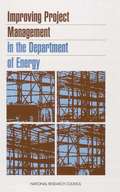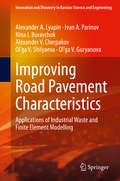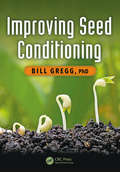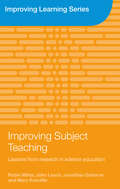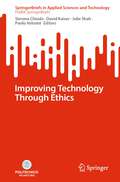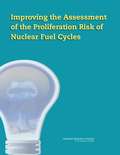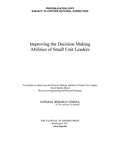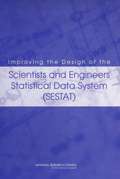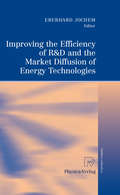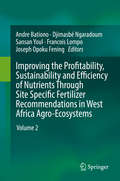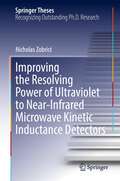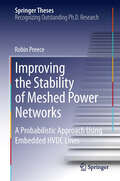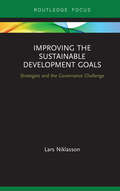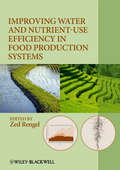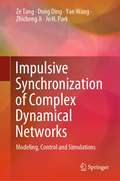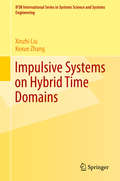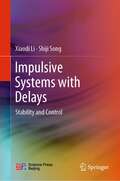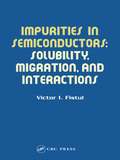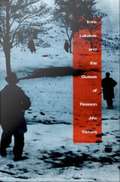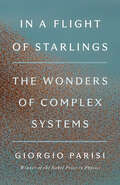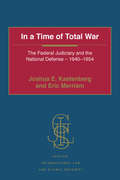- Table View
- List View
Improving Project Management in the Department of Energy
by National Research CouncilThe U. S. Department of Energy has been at the center of many of the greatest achievements in science and engineering in this century. DOE spends billions of dollars funding projects - and plans to keep on spending at this rate. But, documentation shows that DOE's construction and environmental remediation projects take much longer and cost 50% more than comparable projects undertaken by other federal agencies, calling into question DOE's procedures and project management. What are the root causes for these problems?
Improving Road Pavement Characteristics: Applications of Industrial Waste and Finite Element Modelling (Innovation and Discovery in Russian Science and Engineering)
by Alexander A. Lyapin Ivan A. Parinov Nina I. Buravchuk Alexander V. Cherpakov Ol’ga V. Shilyaeva Ol’ga V. GuryanovaThe book presents original technologies developed by the authors and existing Russian experience in study and application of technogenic raw materials (such as burnt rocks of mine dumps and ash-slag waste) to R&D of road constructions with high-strength properties and long-life operation. Another direction of the book is connected with finite-element modeling pavement constructions on different soils. To this aim, corresponding theoretical solutions and numerical algorithms are realized in ANSYS software. The obtained numerical results are compared with existing experimental data for real road constituents. It presents particular results of the Russian schools of Mechanics and Material Sciences not previously available outside of Russia. Explains original theoretical and experimental methods developed for solution of the problems of effective using technogenic waste in building and road constructions;Facilitates improvement and optimization of theoretical and numerical approaches for R&D of road pavements on different soils;Describes new promising building materials based on easily accessible waste able effectively to replace conventional materials and supported by Russian patents.
Improving Seed Conditioning
by Bill GreggSeed conditioning is the final process that establishes the quality of a seed lot and determines its value. It is a complex process involving a significant series of machines, each of which must be used in the proper sequence of the entire process, and each machine must be carefully and properly adjusted and set up for each lot of seed. If the conditioning plant operator does not have sufficient knowledge of how to set up and adjust each of the machines, then an excessive amount of good seed is lost during conditioning and not all undesirable materials are removed. Therefore, the performance of seed conditioning depends entirely on how effectively the operator sets up and adjusts the machines. Much effort has been spent in developing seed technology so as to produce high quality seed, but performance of seed conditioning by maximizing the operator’s knowledge of getting the best performance from each of his machines has not been carefully and completely developed. Improving Seed Conditioning focuses on teaching the conditioning plant operator details of each machine and how to get maximum performance from it in terms of operating efficiency, maximum removal of undesirable particles, and minimum loss of good seed. Organized in a manner that focuses on the specific machine models installed in each operator’s specific plant, this manual is set up to be used as text material in training classes or as a guide for operators employed by seed companies.
Improving Subject Teaching: Lessons from Research in Science Education (Improving Learning)
by John Leach Robin Millar Jonathan Osborne Mary RatcliffeIn many countries, questions are being raised about the quality and value of educational research. This book explores the relationship between research and practice in education. It looks at the extent to which current practice could be said to be informed by knowledge or ideas generated by research and at the extent to which the use of current practices or the adoption of new ones are, or could be, supported by research evidence. Science education is used as a case study but the issues considered apply to the teaching and learning of any curriculum subject. The book draws on the findings of four inter-related research studies and considers: how research might be used to establish greater consensus about curriculum; how research can inform the design of assessment tools and teaching interventions; teachers’ and other science educators’ perceptions of the influence of research on their teaching practices and their students’ learning; the extent to which evidence can show that an educational practice ‘works’.
Improving Technology Through Ethics (SpringerBriefs in Applied Sciences and Technology)
by Simona Chiodo David Kaiser Julie Shah Paolo VolontéThis book deals with the ethics of technology and addresses specific ethical problems related to some emerging technologies, mainly in the field of computer science (from machine learning models to extracting value from data to human–robot interaction). The contributions are authored mainly by scholars in ICT and other engineering fields who reflect on ethical and societal issues emerging from their own research activity. Thus, rather uniquely, the work overcomes the traditional divide between pure ethical theory that disregards what practitioners do and mere R&D practice that ignores what theorists conceptualize. Conversely, the reader is enabled to understand what ethics means when it is actually put into work by engineering researchers. The book arises from a joint program between MIT and Politecnico di Milano aimed at training early career researchers in addressing the ethical issues of technology and critically reflecting on the social impacts of the emerging, and even disruptive, technologies they are currently developing through their novel research. Overall, it aims at spreading the task of developing technologies that, from the beginning, are designed to be responsible for human life, society, and nature.
Improving the Air Force Scientific Discovery Mission: A Workshop Report
by Committee on Improving the Air Force Scientific Discovery Mission: Leveraging Best Practices in Basic Research Management: A WorkshopIn 2015, the Air Force Studies Board conducted a workshop, consisting of two data-gathering sessions, to review current research practices employed by the Air Force Office of Scientific Research (AFOSR). Improving the Air Force Scientific Discovery Mission summarizes the presentations and discussions of these two sessions. This report explores the unique drivers associated with management of a 6. 1 basic research portfolio in the Department of Defense and investigates current and future practices that may further the effective and efficient management of basic research on behalf of the Air Force
Improving the Assessment of the Proliferation Risk of Nuclear Fuel Cycles
by Division on Earth and Life Studies Committee on Improving the Assessment of the Proliferation Risk of Nuclear Fuel Cycles Nuclear and Radiation Studies Board National Research CouncilThe material that sustains the nuclear reactions that produce energy can also be used to make nuclear weapons--and therefore, the development of nuclear energy is one of multiple pathways to proliferation for a non-nuclear weapon state. There is a tension between the development of future nuclear fuel cycles and managing the risk of proliferation as the number of existing and future nuclear energy systems expands throughout the world. As the Department of Energy (DOE) and other parts of the government make decisions about future nuclear fuel cycles, DOE would like to improve proliferation assessments to better inform those decisions. Improving the Assessment of the Proliferation Risk of Nuclear Fuel Cycles considers how the current methods of quantification of proliferation risk are being used and implemented, how other approaches to risk assessment can contribute to improving the utility of assessments for policy and decision makers. The study also seeks to understand the extent to which technical analysis of proliferation risk could be improved for policy makers through research and development.
Improving the Decision Making Abilities of Small Unit Leaders
by Naval Studies Board Division on Engineering and Physical Sciences National Research Council Committee on Improving the Decision Making Abilities of Small Unit LeadersFor the past decade, the U.S. Marine Corps and its sister services have been engaged in what has been termed "hybrid warfare," which ranges from active combat to civilian support. Hybrid warfare typically occurs in environments where all modes of war are employed, such as conventional weapons, irregular tactics, terrorism, disruptive technologies, and criminality to destabilize an existing order. In August 2010, the National Research Council established the Committee on Improving the Decision Making Abilities of Small Unit Leaders to produce Improving the Decision Making Abilities of Small Unit Leaders. This report examines the operational environment, existing abilities, and gap to include data, technology, skill sets, training, and measures of effectiveness for small unit leaders in conducting enhanced company operations (ECOs) in hybrid engagement, complex environments. Improving the Decision Making Abilities of Small Unit Leaders also determines how to understand the decision making calculus and indicators of adversaries. Improving the Decision Making Abilities of Small Unit Leaders recommends operational and technical approaches for improving the decision making abilities of small unit leaders, including any acquisition and experimentation efforts that can be undertaken by the Marine Corps and/or by other stakeholders aimed specifically at improving the decision making of small unit leaders. This report recommends ways to ease the burden on small unit leaders and to better prepare the small unit leader for success. Improving the Decision Making Abilities of Small Unit Leaders also indentifies a responsible organization to ensure that training and education programs are properly developed, staffed, operated, evaluated, and expanded.
Improving the Design of the Scientists and Engineers Statistical Data System (SESTAT)
by National Research CouncilInformation on Improving the Design of the Scientists and Engineers Statistical Data System
Improving the Efficiency of R&D and the Market Diffusion of Energy Technologies
by Sascha Ruhland Eberhard Jochem Bernd Ebersberger Jakob Edler Clemens Cremer Harald Bradke Peter Radgen Wilhelm Mannsbar Frank Marscheider-Weidemann Alexandra Krebs Carsten Dreher Oliver SomIs there a chance that public or private research and development institutions can improve the efficiency of the R&D process? This book gives a positive answer by designing an integrated concept of the science technology cycle and the innovation system of each technology. The position of a new technology in the sciencetechnology cycle is identified by several indicators from patent analysis, citations and market information data. The innovation system supports the search for a comprehensive understanding of all important stakeholders of an innovation, possible obstacles and related policies. The application of the methodology leads to convincing results: the hype of the PEM fuel cell activities could have been identified at the end of the 1990s as the phase of euphoria, but not as a situation close to market entry in the car or boiler markets.
Improving the Profitability, Sustainability and Efficiency of Nutrients Through Site Specific Fertilizer Recommendations in West Africa Agro-Ecosystems
by Andre Bationo Djimasbé Ngaradoum Sansan Youl Francois Lompo Joseph Opoku FeningAs part of its efforts to improve fertilizer use and efficiency in West Africa, and following the recent adoption of the West African fertilizer recommendation action plan (RAP) by ECOWAS, this volume focuses on IFDC's technical lead with key partner institutions and experts to build on previous and current fertilizer recommendations for various crops and countries in West Africa for wider uptake by public policy makers and fertilizer industry actors.
Improving the Profitability, Sustainability and Efficiency of Nutrients Through Site Specific Fertilizer Recommendations in West Africa Agro-Ecosystems
by Andre Bationo Djimasbé Ngaradoum Sansan Youl Francois Lompo Joseph Opoku FeningAs part of its efforts to improve fertilizer use and efficiency in West Africa, and following the recent adoption of the West African fertilizer recommendation action plan (RAP) by ECOWAS, this volume focuses on IFDC's technical lead with key partner institutions and experts to build on previous and current fertilizer recommendations for various crops and countries in West Africa for wider uptake by public policy makers and fertilizer industry actors.
Improving the Resolving Power of Ultraviolet to Near-Infrared Microwave Kinetic Inductance Detectors (Springer Theses)
by Nicholas ZobristThis thesis represents a breakthrough in our understanding of the noise processes in Microwave Kinetic Inductance Detectors (MKIDs). While the detection of ultraviolet to near-infrared light is useful for a variety of applications from dark matter searches to biological imaging and astronomy, the performance of these detectors often limits the achievable science. The author’s work explains the limits on spectral resolution broadening, and uses this knowledge to more than double the world record spectral resolution for an MKID suitable for optical and near-IR astrophysics, with emphasis on developing detectors for exoplanet detection. The techniques developed have implication for phonon control in many different devices, particularly in limiting cosmic ray-induced decoherence in superconducting qubits. In addition, this thesis is highly accessible, with a thorough, pedagogical approach that will benefit generations of students in this area.
Improving the Stability of Meshed Power Networks
by Robin PreeceThe work in this thesis proposes the innovative use of modern technologies and mathematical techniques to analyse and control future power systems. It exploits new enabling technologies such as Voltage Source Converter High Voltage Direct Current (VSC-HVDC) lines, both single and multi-terminal, and Wide Area Measurement Systems (WAMS) to reduce the risks of instability associated with greater utilisation of modern power systems. New control systems for these technologies have been analysed, and subsequently designed, using advanced probabilistic analysis techniques to ensure that they are robust to the variable and turbulent conditions expected in the future. The advanced probabilistic techniques used in the thesis for both system analysis and controller design represent one of the first such applications in open literature.
Improving the Sustainable Development Goals: Strategies and the Governance Challenge (Routledge Focus on Environment and Sustainability)
by Lars NiklassonImproving the Sustainable Development Goals evaluates the Global Goals (Agenda 2030) by looking at their design and how they relate to theories of economic development. Adopted unanimously by the member states of the United Nations (UN) in 2015, the goals are remarkable for the global commitment on a set of targets to reach by 2030, but also for the lack of a strategy of implementation. The choice of appropriate action is handed over to individual governments, some of which are limited by their lack of resources. This book explores how implementation of the sustainable development goals (SDGs) can be developed, especially in developing countries. The content, strengths and weaknesses of the SDGs are critically examined, alongside their relationship to ongoing academic research. The authors also investigate the actions of governments over the past three years by looking at the national strategies they have presented at annual meetings of the UN High-Level Political Forum. Improving the Sustainable Development Goals takes a critical but constructive approach, pointing out risks as well as possible remedies. The SDGs are seen as an opportunity for a global conversation on what works in solving some fundamental problems relating to poverty and environmental degradation. With the inclusion of a chapter by Tobias Ogweno, former member of the Kenya’s UN mission, this book will appeal to all those who are interested in policy analysis with a focus on development issues.
Improving the U.S. Military's Understanding of Unstable Environments Vulnerable to Violent Extremist Groups: Insights from Social Science
by David E. Thaler Ryan Andrew Brown Gabriella C. Gonzalez Blake W. Mobley Parisa RoshanFor over a decade, operations associated with irregular warfare have placed large demands on U. S. ground forces and have led to development of new Army and Joint doctrine. This report helps analysts identify and assess twelve key factors that create and perpetuate environments susceptible to insurgency, terrorism, and other extremist violence and instability to inform military decisions on allocation of analytic and security assistance resources.
Improving Water and Nutrient-Use Efficiency in Food Production Systems
by Zed RengelImproving Water and Nutrient Use Efficiency in Food Production Systems provides professionals, students, and policy makers with an in-depth view of various aspects of water and nutrient us in crop production. The book covers topics related to global economic, political, and social issues related to food production and distribution, describes various strategies and mechanisms that increase water and nutrient use efficiency, and review te curren situation and potential improvements in major food-producing systems on each continent. The book also deals with problems experienced by developed countries separtaely from problems facing developing countries.Improving Water and Nutrient Use Efficiency emphasizes judicious water and nutrient management which is aimed at maximising water and nutrient utilisation in the agricultural landscape, and minimising undesirable nutrient losses to the environment.
Impulsive Synchronization of Complex Dynamical Networks: Modeling, Control and Simulations
by Ze Tang Dong Ding Yan Wang Zhicheng Ji Ju H. ParkThis book is mainly focused on the global impulsive synchronization of complex dynamical networks with different types of couplings, such as general state coupling, nonlinear state coupling, time-varying delay coupling, derivative state coupling, proportional delay coupling and distributed delay coupling. Studies on impulsive synchronization of complex dynamical networks have attracted engineers and scientists from various disciplines, such as electrical engineering, mechanical engineering, mathematics, network science, system engineering. Pursuing a holistic approach, the book establishes a fundamental framework for this topic, while emphasizing the importance of network synchronization and the significant influence of impulsive control in the design and optimization of complex networks. The primary audience for the book would be the scholars and graduate students whose research topics including the network science, control theory, applied mathematics, system science and so on.
Impulsive Systems on Hybrid Time Domains (IFSR International Series in Systems Science and Systems Engineering #33)
by Xinzhi Liu Kexue ZhangThis monograph discusses the issues of stability and the control of impulsive systems on hybrid time domains, with systems presented on discrete-time domains, continuous-time domains, and hybrid-time domains (time scales). Research on impulsive systems has recently attracted increased interest around the globe, and significant progress has been made in the theory and application of these systems. This book introduces recent developments in impulsive systems and fundamentals of various types of differential and difference equations. It also covers studies in stability related to time delays and other various control applications on the different impulsive systems. In addition to the analyses presented on dynamical systems that are with or without delays or impulses, this book concludes with possible future directions pertaining to this research.
Impulsive Systems with Delays: Stability and Control
by Xiaodi Li Shiji SongThis book systematically presents the most recent progress in stability and control of impulsive systems with delays. Impulsive systems have recently attracted continued high research interests because they provide a natural framework for mathematical modeling of many real-world processes. It focuses not only on impulsive delayed systems, but also impulsive systems with delayed impulses and impulsive systems with event-triggered mechanism, including their Lyapunov stability, finite-time stability and input-to-state stability synthesis. Special attention is paid to the bilateral effects of the delayed impulses, where comprehensive stability properties are discussed in the framework of time-dependent and state-dependent delays. New original work with event-triggered impulsive control and its applications in multi-agent systems and collective dynamics are also provided. This book will be of use to specialists who are interested in the theory of impulsive differential equations and impulsive control theory, as well as high technology specialists who work in the fields of complex networks and applied mathematics. Also, instructors teaching graduate courses and graduate students will find this book a valuable source of nonlinear system theory.
Impurities in Semiconductors: Solubility, Migration and Interactions
by Victor I. FistulThis text explores the behavior of impurity atoms in semiconductors, integrating experimental data with their theoretical interpretation. It begins by explaining the basic physics of hydrogen-like impurities, atoms with partially filled electron shells, and amphoteric, isovalent, and gas-forming impurities to explain the properties imparted by these impurities. The author also analyzes the macroscopic and microscopic mechanisms of the solubility and migration of impurities and defects in the crystal lattice. Impurities in Semiconductors brings to light work done in the former Soviet Union and highlights several impurities that have potential, but have not yet found widespread application.
Imre Lakatos and the Guises of Reason
by John KadvanyThe Hungarian migr Imre Lakatos (1922-1974) earned a worldwide reputation through the influential philosophy of science debates involving Thomas Kuhn, Paul Feyerabend, and Sir Karl Popper. In Imre Lakatos and the Guises of Reason John Kadvany shows that embedded in Lakatos's English-language work is a remarkable historical philosophy rooted in his Hungarian past. Below the surface of his life as an Anglo-American philosopher of science and mathematics, Lakatos covertly introduced novel transformations of Hegelian and Marxist ideas about historiography, skepticism, criticism, and rationality. Lakatos escaped Hungary following the failed 1956 Revolution. Before then, he had been an influential Communist intellectual and was imprisoned for years by the Stalinist regime. He also wrote a lost doctoral thesis in the philosophy of science and participated in what was criminal behavior in all but a legal sense. Kadvany argues that this intellectual and political past animates Lakatos's English-language philosophy, and that, whether intended or not, Lakatos integrated a penetrating vision of Hegelian ideas with rigorous analysis of mathematical proofs and controversial histories of science. Including new applications of Lakatos's ideas to the histories of mathematical logic and economics and providing lucid exegesis of many of Hegel's basic ideas, Imre Lakatos and the Guises of Reason is an exciting reconstruction of ideas and episodes from the history of philosophy, science, mathematics, and modern political history.
In a Flight of Starlings: The Wonders of Complex Systems
by Giorgio ParisiFrom the 2021 Nobel Prize winner in Physics, an enlightening and personal journey into the practice of groundbreaking science &“[Giorgio Parisi is] an extraordinary scientist.&” —Carlo RovelliWith In a Flight of Starlings, celebrated physicist Giorgio Parisi guides us through his unorthodox yet exhilarating work, starting with investigating the principles of physics by observing the flight of flocks of birds. Studying the movements of these communities, he has realized, proves an illuminating way into understanding complex systems of all kinds—collections of everything from atoms and planets to other animals, such as ourselves.Along the way, he reflects on the lessons he has taken from a life in pursuit of scientific truth: the importance of serendipity to the discovery of new ideas, the surprising kinship between physics and other disciplines, and the value of science to a thriving society. In so doing, he removes the practice of science from the confines of the laboratory and brings it into the real world.Part elegant scientific treatise, part thrilling journey of discovery, In a Flight of Starlings is an invitation to find wonder in the world around us.
In a Patch of Fireweed: A Biologist's Life in the Field
by Bernd HeinrichWhy would a grown man chase hornets with a thermometer, paint whirligig beetles bright red, or track elephants through the night to fill trash bags with their prodigious droppings? Some might say—to advance science. Bernd Heinrich says—because it’s fun. Heinrich, author of the much acclaimed Bumblebee Economics, has been playing in the wilds of one continent or another all his life. In the process, he has become one of the world’s foremost physiological ecologists. With In a Patch of Fireweed, he will undoubtedly become one of our foremost writers of popular science. Part autobiography, part case study in the ways of field biology, In a Patch of Fireweed is an endlessly fascinating account of a scientist’s life and work. For the author, it is an opportunity to report not just his results but the curiosity, humor, error, passion, and competitiveness that feed into the process of discovery. For the reader, it is simply a delight, a rare chance to share the perceptions of an unusual mind fully in tune with the inner workings of nature. Before his years of research in the woodlands and deserts of North America, the New Guinea highlands, and the plains of East Africa, Heinrich had a sense of the wild that few people in this century can know. He tells the whole story, from his refugee childhood hidden in a German forest, eating mice fried in boar fat, to his ongoing research in the woods surrounding his cabin in Maine.
In a Time of Total War: The Federal Judiciary and the National Defense - 1940-1954 (Justice, International Law and Global Security)
by Joshua E. Kastenberg Eric MerriamThis book is a judicial, military and political history of the period 1941 to 1954. As such, it is also a United States legal history of both World War II and the early Cold War. Civil liberties, mass conscription, expanded military jurisdiction, property rights, labor relations, and war crimes arising from the conflict were all issues to come before the federal judiciary during this period and well beyond since the Supreme Court and the lower courts heard appeals from the government’s wartime decisions well into the 1970s. A detailed study of the judiciary during World War II evidences that while the majority of the justices and judges determined appeals partly on the basis of enabling a large, disciplined, and reliable military to either deter or fight a third world war, there was a recognition of the existence of a tension between civil rights and liberties on the one side and military necessity on the other. While the majority of the judiciary tilted toward national security and deference to the military establishment, the judiciary’s recognition of this tension created a foundation for persons to challenge governmental narrowing of civil and individual rights after 1954. Kastenberg and Merriam present a clearer picture as to why the Court and the lower courts determined the issues before them in terms of external influences from both national and world-wide events. This book is also a study of civil-military relations in wartime so whilst legal scholars will find this study captivating, so will military and political historians, as well as political scientists and national security policy makers.
